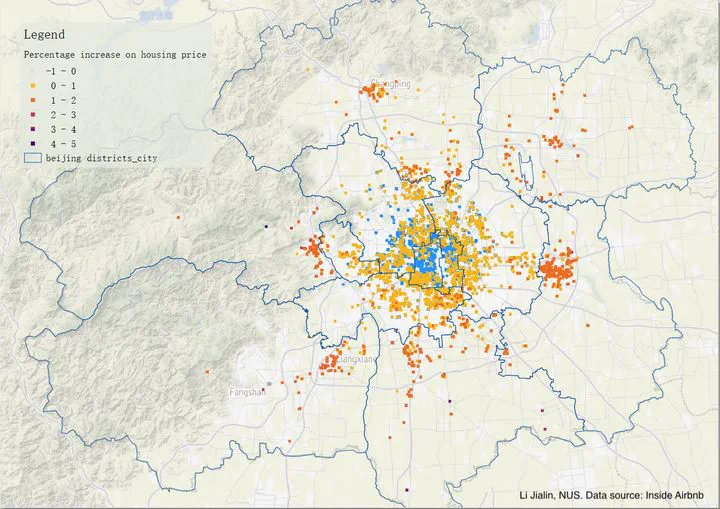Li Jialin defends her thesis on analysing the influence of short-term rental business on housing prices
 Sensitivity score of neighbourhoods in Beijing
Sensitivity score of neighbourhoods in BeijingMaster of Urban Planning student Jialin Li successfully defended her thesis The Implementation of Big Data Analysis in Regulating Online Short-Term Rental Business: A case of Airbnb in Beijing. The abstract follows:
Since its founding in 2009, Airbnb has grown into one of the most successful sharing economy company in the world. Expanding its presence in 65,000 cities and 191 countries within 9 years, Airbnb has quietly reshaped our cities. The aim of this thesis is to reveal how Airbnb is influencing Beijing’s neighbourhood housing price and where is the impact most prominent. Four machine learning models based on various algorithms are developed and trained to analyse the pattern behind housing prices. Random forest model is then selected to be model of the best fit and used to conduct sensitivity analysis on neighbourhood housing prices given a unit change in Airbnb activity. The spatial pattern of sensitivity results is then geo-visualized. The results revealed that neighbourhoods along axial roads connecting to core districts and locating in sub-centre of periphery districts are more likely to be price sensitive to Airbnb activity. In addition, this thesis discusses the possibility of using big data analysis and geo-visualization as tool kit for Airbnb regulation and attempts to respond to the findings through location- specific regulations. A series of policy recommendation is then given based on results of neighbourhood sensitivity scores.
A conference paper summarising the work will be published in autumn.
Congrats Jialin! 👏 Thanks for the collaboration and we wish you all the best in the continuation of your career as planner at Surbana Jurong.